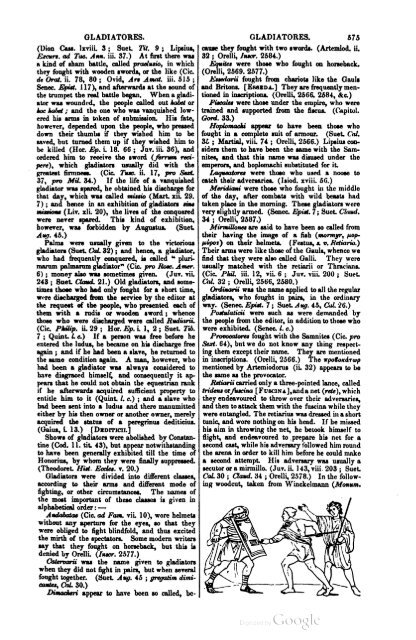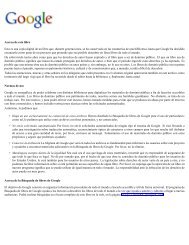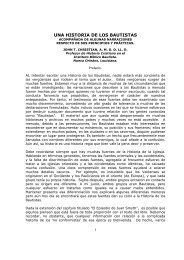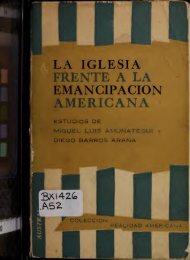- Page 1 and 2:
Acerca de este libro Esta es una co
- Page 3 and 4:
Adictionary of Greek and Roman anti
- Page 5 and 6:
p p
- Page 7:
DICTIONARY GREEK AND ROMAN ANTIQUIT
- Page 11:
LIST OF WRITERS. INITIALS. NAMES. A
- Page 14 and 15:
viii PREFACE TO THE SECOND EDITION.
- Page 16 and 17:
X TKEFACK TO THE FIRST EDITION. us
- Page 18 and 19:
PREFACE TO THE FIRST EDITION. " lit
- Page 20 and 21:
2 ABORTIO. ACCEPTILATIO. (Cic Verr.
- Page 22 and 23:
4 ACIIA1CUM FOEDUS. ACHAICUM FOEDUS
- Page 24 and 25:
6 ACINACES. ACROTERIUM. close union
- Page 26 and 27:
adventures, with the names of the p
- Page 28 and 29:
10 ACTIO. ACTIO. That body of law w
- Page 30 and 31:
12 ACTIO. ACTIO. might afterwards g
- Page 32 and 33:
11 ADLECTI ADOPTIO. taken from orig
- Page 34 and 35:
10 ADORATIO. ADULTERIUM. of very do
- Page 36 and 37:
18 AEDILES. AEDILES. of property. (
- Page 38 and 39:
Tiberius (Tacit. Ann. iv. 35.) The
- Page 40 and 41:
22 AENUM. AERARII. AEINAUTAE (aeiMt
- Page 42 and 43:
24 AERARIUM. AERARIUM. that it was
- Page 44 and 45:
26 AES EQUESTRE. AES UXORIUM. bronz
- Page 46 and 47:
28 AFFINES, AFF1NITAS. AGELA. of th
- Page 48 and 49:
30 AGER AGER they were called Subru
- Page 50 and 51:
■:.-2 AGORA. AGORA. The etymology
- Page 52 and 53:
24 AGORA. AGORA. also used as a tre
- Page 54 and 55:
36 AGORA. AORAPHIOU GRAPIIE. in the
- Page 56 and 57:
311 AGRARIAE LEGES. AGRARIAE LEGES.
- Page 58 and 59:
40 AGRARIAE LEGES. AGRARIAE LEGES.
- Page 60 and 61:
4 "J AG1URIAE LEGE& AGRARIAE LEGES.
- Page 62 and 63:
44 AGRICULTURA. AGRICULTURA. was a
- Page 64 and 65:
46 AGRICULTURA. AGRICULTURA. turn),
- Page 66 and 67:
48 AGRICULTURA. AGRICULTURA. circum
- Page 68 and 69:
*© AGRICULTURA. AGRICULTURA. oan
- Page 70 and 71:
52 AGRICULTURA. AGRICULTURA. leu in
- Page 72 and 73:
54 AGRICULTURAL AGR1CULTURA. reeds
- Page 74 and 75:
S6 AGRICULTURA. AGRICULTURA. for ma
- Page 76 and 77:
58 AGRICULTURA. AGRICULTURA. having
- Page 78 and 79:
CO AGRICULTURA. AGRICULTURA. horses
- Page 80 and 81:
62 AGRICULTURA. AGRICULTURE tiroes
- Page 82 and 83:
the boves domestici. The common num
- Page 84 and 85:
66 AGRICULTURA. AORICULTURA. duce,
- Page 86 and 87:
C8 AGIUCULTURA. a sort of endive. I
- Page 88 and 89:
70 AGRICULTURA. AGRICULTURA. with u
- Page 90 and 91:
72 AGRIONIA AGROTERAS THUS1A. The A
- Page 92 and 93:
7i ALAUDA. A LEA. 4. Lastly, under
- Page 94 and 95:
7fi ALLUVIO. AMBITUS. African sand,
- Page 96 and 97:
78 AMBITUS. aMICTUS. in whole or in
- Page 98 and 99:
I AMPHICTYONES. 149; Dionys. iv. 25
- Page 100 and 101:
82 AMPHICTYONS. AMPHITHEATRUM. with
- Page 102 and 103:
84 AMPHITHEATRUM. AMPHITHEATRUM. si
- Page 104 and 105:
86 AMPH1THEATRUM. AMPHITHEATRUM. Th
- Page 106 and 107:
88 AMPHITHEATRUM. AMPHITHEATRUM. b.
- Page 108 and 109:
90 AMPHORA. AMPHORA. art. Aries.) B
- Page 110 and 111:
92 ANAKEIA. ANAKRISIS. describes it
- Page 112 and 113:
94 ANAXAGOREIA. ANGARIA. was differ
- Page 114 and 115:
ANNULUS. Antonius Musa, a physician
- Page 116 and 117:
98 ANTEFIXA. ANTIDOSIS. moulds, and
- Page 118 and 119:
■ 100 ANTLIA. . ANTLIA. From what
- Page 120 and 121:
102 APEX, APHRODISIA. tim was remov
- Page 122 and 123:
101 APOPHORA. APOSTOLEIS. place. Ac
- Page 124 and 125:
10« APPELLATIO. APPELLATIO. be obt
- Page 126 and 127:
103 AQUAEDUCTUS. AQUAEDUCTUS. to ci
- Page 128 and 129:
110 AQUAEDUCTUS. AQUAEDUCTUS. Its l
- Page 130 and 131:
i I 112 AQUAEDUCTUS. AQUAEDUCTUS. a
- Page 132 and 133:
114 AQUAEDUCTUS. AQUAEDUCTUS. Aqua
- Page 134 and 135:
116 AHA. ARA. land ; or by the owne
- Page 136 and 137:
118 ARATRUM. ARATRUM. (Excursion in
- Page 138 and 139:
120 AUCHITECTURA. ARCHITECTURA. gov
- Page 140 and 141:
122 ARCIION. ARCHON. after passing
- Page 142 and 143:
124 ARCIION. AKCUS. (">Spto>s yp&pa
- Page 144 and 145:
126 ARCUS. AUEIOPAGUS. specimens of
- Page 146 and 147:
128 AREIOPAGUS. AREIOPAGUS. demos.
- Page 148 and 149:
130 AROENTARII. ARGENTARII. to Home
- Page 150 and 151:
132- ARGENTUM. ARGENTUM. Sat. i. 6.
- Page 152 and 153:
134 ARISTOCRATIA. ARISTOCRATIA. ari
- Page 154 and 155:
136 AKMILLA. ARMILLA. properly bell
- Page 156 and 157:
138 ARVALES FRATRES. ARVALES FRATRE
- Page 158 and 159:
WO AS. AS. were accompanied by a re
- Page 160 and 161:
142 ASEBEIAS ORAPHE. ASILLA. a he-g
- Page 162 and 163:
,44 ASTROLOGIA. ASTROLOGIA. in the
- Page 164 and 165:
I4C ASTRONOMIA. which, as we are as
- Page 166 and 167:
ASTRONOMIA. tan in the Little Bear
- Page 168 and 169:
ISO ASTRONOMIA. ASTRONOMIA. Hclle f
- Page 170 and 171:
152 ASTROXOMIA. ASTRONOMIA. Great F
- Page 172 and 173:
154 ASTRONOMIA. ASTRONOMIA. Before
- Page 174 and 175:
156 ASTRONOMIA. ASTRONOMIA. other h
- Page 176 and 177:
ASTRONOMIA. he inculcates may be th
- Page 178 and 179:
160 ASTRONOMIA. ASTRONOMIA. month o
- Page 180 and 181:
1 02 ASTRONOMIA. ASTRONOMIA. " Orio
- Page 182 and 183:
164 ASTltONOMIA. ASTRONOMIA. Aeschy
- Page 184 and 185:
ATELEIA. § 12). ThiB constitutio o
- Page 186 and 187:
1GB ATIMIA. have been frequently co
- Page 188 and 189:
170 ATLANTE& ATRAMENTUM. Hating con
- Page 190 and 191:
172 AUCTIO. AUCTOR. above and below
- Page 192 and 193:
174 AUGUR. AUGUR. probation and con
- Page 194 and 195:
176 AUGUR. AUGUR. came the practice
- Page 196 and 197:
173 AUGUR. AUGUR nuntiafio (perhaps
- Page 198 and 199:
180 AUGUSTALES. AURUM. Gruter (316.
- Page 200 and 201:
182 AURUM. AUSP1CIUM. came into cir
- Page 202 and 203:
liU BALNEAE. BALNEA E. balnearum (l
- Page 204 and 205:
186 BALNEAE. BALNEAE. describes the
- Page 206 and 207:
188 BALNEAE. BALNEAE. to as a daily
- Page 208 and 209:
.90 BALNEAE. BALNEAE. construction,
- Page 210 and 211:
1.0-2 BALNEAE. BALNEAE. kemixphaeri
- Page 212 and 213:
194 BALNEAE. BALNEAE. ample remains
- Page 214 and 215:
136 BALTEUS. BARBA. the lower oncB
- Page 216 and 217:
198 BASILICA, BASILICA. something b
- Page 218 and 219:
200 BASILICA. BAXA. empire apply th
- Page 220 and 221:
202 BIBLIOTHECA. BIBLIOTHKCA. son w
- Page 222 and 223:
sider that the damage done by Philo
- Page 224 and 225:
206 BONA, BONA CADUCA. in the same
- Page 226 and 227:
208 BONORUM EMTIO, BONORUM POSSESSI
- Page 228 and 229:
210 BOULE. BOULE. representative, a
- Page 230 and 231:
212 BOULE. BOULE. and responsible (
- Page 232 and 233:
214 BRAURONIA. BREVIARIUM. at Spart
- Page 234 and 235:
210 BYSSUS. CACABUS. Verr. i. 58) ;
- Page 236 and 237:
218 CADUS. CAELATURA. were brought,
- Page 238 and 239:
220 CALATHUS. CALCEUS. 12. s.55, xx
- Page 240 and 241:
222 CALENDAR! UM. CALENDARIUM. The
- Page 242 and 243:
224 CALENDARIUM. CALENDARIUM. It sh
- Page 244 and 245:
226 CALENDARIUM. CALENDARIUM. The s
- Page 246 and 247:
221 CALENDARIUM. CALENDAR! UM. way
- Page 248 and 249:
230 CALENDARIUM. CALENDARIUM. We gi
- Page 250 and 251:
232 CALENDARIUM. CALENDARIUM. refer
- Page 252 and 253:
nian LVmeter. The women taking part
- Page 254 and 255:
235 CANDELABRUM. CANDELABRUM. the c
- Page 256 and 257:
238 CAPISTRUM. CAPSA. form. (Athen.
- Page 258 and 259:
210 CARCER. CARCER. A judicium capi
- Page 260 and 261:
242 CARNIFEX. CARPENTUM. Carncios,
- Page 262 and 263:
2-U CASTRA. CASTRA. CASSIS. [Galea
- Page 264 and 265:
246 CASTRA. CASTRA. march by a regu
- Page 266 and 267:
248 CASTRA. CASTUA. and left of the
- Page 268 and 269:
250 CASTRA. CASTRA rally speaks of
- Page 270 and 271:
212 CASTRA. CASTRA. (Fig. 3.) PORTA
- Page 272 and 273:
254 CASTRA, CASTRA. perhaps the Pra
- Page 274 and 275:
25t> CATAPIIRACTI. CATARACTA. (Ta£
- Page 276 and 277:
The word KairnKuoy signified, as ha
- Page 278 and 279:
CELLA. if any person recovered it f
- Page 280 and 281:
362 CENSOR. CENSOR. the emperors in
- Page 282 and 283:
264 CENSOR. CENSOR. ing the animadv
- Page 284 and 285:
2S6 CENSUS. CENSUS. of the censorsh
- Page 286 and 287:
268 CEREALIA. CERTI. in early timet
- Page 288 and 289:
270 CIIALCIDICUM. CIIARISTIA. decor
- Page 290 and 291:
272 CHIRURGIA. CHIRURGIA. given to
- Page 292 and 293:
274 CHIltURGIA. CHIRURGIA. entirely
- Page 294 and 295:
CHOREGUS. (chlamyde coecinca, Lampr
- Page 296 and 297:
278 CHORUS. CHORUS. dence, are best
- Page 298 and 299:
280 CHORUS. CHRONOLOG1A. TpayipSia
- Page 300 and 301:
282 CHTHONIA. UPPU& themselves. M.
- Page 302 and 303:
2S14 CIRCUS. CIRCUS. J terniption t
- Page 304 and 305:
286 CIRCUS. CIRCUS. Murciam, from t
- Page 306 and 307:
388 CISTA CIVITAS. times the contes
- Page 308 and 309:
290 CIVITAS. CIVITAS. maternal gran
- Page 310 and 311:
202 CIVITAS. CIVITAS. form, of beco
- Page 312 and 313:
294 . CLAVUS LATUS. CLIENS. and Abe
- Page 314 and 315:
296 CM ENS. CLIMA. It is stated by
- Page 316 and 317:
290 CLIPEUS. CLIPEUS. Ttpiipipna or
- Page 318 and 319:
300 KLOPES DIKE. COCHLEA. year 1742
- Page 320 and 321:
302 CODEX. CODEX. Justinian himself
- Page 322 and 323:
304 COENA. COENA. sit down together
- Page 324 and 325:
300 COENA. COENA. and the introduct
- Page 326 and 327:
308 COENA. COENA. ivory or tortoiae
- Page 328 and 329:
I 310 COGNATL COLLEGIUM. Tritavus,
- Page 330 and 331:
312 COLONATUS. COLONATUS. should go
- Page 332 and 333:
314 COLONIA. COLON IA. a colony of
- Page 334 and 335:
316 . COLON 1 A. COLONIA. for suppo
- Page 336 and 337:
318 COLON I A. COLONIA. strangers t
- Page 338 and 339:
320 COLORES. COLORES. the passing o
- Page 340 and 341:
322 COLOSSUS. COLUM. vapair6ptov% s
- Page 342 and 343:
324 COLUMNA. COLUMNA. each of the p
- Page 344 and 345:
326 COLUMN.*. COLUMNA, cornice betw
- Page 346 and 347:
COLUMNARIUM. capital. The inscripti
- Page 348 and 349:
330 COMES. COMITTA. pillus, caesart
- Page 350 and 351:
333 COMITIA. COMITIA. certain ; and
- Page 352 and 353:
331 COMITIA. COMITIA. According to
- Page 354 and 355:
336 COMITIA. COMITIA. ho might gran
- Page 356 and 357:
338 COMITIA. COMITIA. legislative c
- Page 358 and 359:
340 COMITIA. COMMISSORIA LEX. able
- Page 360 and 361:
and violets, and threw skins round
- Page 362 and 363:
344 COMOEDIA. COMOEDIA. than with t
- Page 364 and 365:
own absurdity. It is perfectly clea
- Page 366 and 367:
348 CONCILIUM. CONCIO. yicc of slav
- Page 368 and 369:
350 CONFUSIO. CONGIARIUM. CONFESSO'
- Page 370 and 371:
352 CONSUL, CONSUL. the founder of
- Page 372 and 373:
354 CONSUL. CONSUL. with the census
- Page 374 and 375:
356 CONSUL. CONSUL. nominate a dict
- Page 376 and 377:
358 CORBIS. CORNU. (Caes. Bell. Coi
- Page 378 and 379:
360 CORONA. CORONA. him that defere
- Page 380 and 381:
3G2 CORONA. CORONA. parties, were s
- Page 382 and 383:
364 CORYBANTICA. COSMKTAE. of which
- Page 384 and 385:
3GG COTHURNUS. The slave* were divi
- Page 386 and 387:
US CRATER. CRIMEN. place in the nty
- Page 388 and 389:
ero CROTALUM. . CRUX. or KpoKtarbs
- Page 390 and 391:
372 CUBITUS. CUDO. their masters to
- Page 392 and 393:
374 CUPA. CURATOR. ii. p. G40. No.
- Page 394 and 395:
perspicuity of the language. ( Von
- Page 396 and 397:
578 CURRUS. CURRUS. resident alien,
- Page 398 and 399:
sno CURRUS. CYATIIUS. plete suits o
- Page 400 and 401:
882 DAEDALA. DAMARETION. •f a cym
- Page 402 and 403:
804 DAPHNEPIIORIA. DARICUS. ■moth
- Page 404 and 405:
"3CG DECEMVIRI. DECEMVIRI. Accordin
- Page 406 and 407:
388 DEJECTI EFFUSIVE ACTIO, delator
- Page 408 and 409:
390 DEM10PRATA. DEMOCRATIA. been fi
- Page 410 and 411:
592 DEMUS. DEMUS. off from the wast
- Page 412 and 413:
391 DEPOSITUM. DESULTOR. is equal i
- Page 414 and 415:
396 DIAETETICA. DIAETETAE. the mean
- Page 416 and 417:
son DIAETETAE. great importance, in
- Page 418 and 419:
400 DIAPSEPIIISIS. DIASIA. forth an
- Page 420 and 421:
402 DICASTES. DIKE. the Ilissus, bu
- Page 422 and 423:
404 DIKE. DICTATOR. render him liab
- Page 424 and 425:
406 DICTATOR. DICTATOR. In the same
- Page 426 and 427:
408 DIES. DIES. find at a later tim
- Page 428 and 429:
•10 DIMACHERI. DIONY81A. causa cu
- Page 430 and 431:
412 DIONYSIA. DIONYSIA. days, and t
- Page 432 and 433:
414 DIONYSIA. DIRIBITORES. their pa
- Page 434 and 435:
410 DTVINATIO. DIVINATIO. kinds of
- Page 436 and 437:
418 DIVORTIUM. DIVORTIUM. duct the
- Page 438 and 439:
the other hand, figs. 5, 6, 7, exac
- Page 440 and 441:
422 DOMINIUM. DOMINIUM. (Ulp. Frag,
- Page 442 and 443:
+21 DOM US. DOMUS. by Lysias (De Ca
- Page 444 and 445:
420 DOM US. DOMUS. Portions of the
- Page 446 and 447:
428 DOMUS. DOM US. Carm. iii. 1. 46
- Page 448 and 449:
DOMUS. the family, or intended for
- Page 450 and 451:
432 DOMUS. DONARIA. (3.) The ceilin
- Page 452 and 453:
434 DONATIO. DONATIO MORTIS CAUSA.
- Page 454 and 455:
436 DOS. DOS. DORMITO RIA. [Domus.]
- Page 456 and 457:
430 DRACHMA, DRACHMA. the husband m
- Page 458 and 459:
4 II) ECCLESIA. ECCLESIA. being to
- Page 460 and 461:
442 ECCLESIA. ECCLESIA. traitorousl
- Page 462 and 463:
441 EDICTUM. EDICTUM. of this assem
- Page 464 and 465:
446 EDICTUM THEODORICI. EISAGOGEIS.
- Page 466 and 467:
448 EISANGELIA. EISPHORA. (Don. e,
- Page 468 and 469:
450 ELECTRUM. ELECTRUM. (Demosth.e.
- Page 470 and 471:
452 ELEPIIAS. ELEUSINIA. tot up at
- Page 472 and 473:
454 ELEUSINIA. ELEUTHERIA. mystae n
- Page 474 and 475:
456 EMBATEIA. EMBLEMA. emancipate a
- Page 476 and 477:
EMPHYTEUSIS. words of Pliny (I. c.)
- Page 478 and 479:
460 ENECHYRA. ENGYE. this kind. Her
- Page 480 and 481:
462 EPEUNACTAE. F.PIIEBUS. EO'RA. [
- Page 482 and 483:
the use of saddles was unknown unti
- Page 484 and 485:
466 EPHORI. EPIBATAE. and who is sa
- Page 486 and 487:
4C8 EPIMELETAE. EPISTATES. the offe
- Page 488 and 489:
470 EPOBELIA. EPULONES. mortgages,
- Page 490 and 491:
472 EQU1TES. EQUITES. latter to 200
- Page 492 and 493:
474 EQUITES. EQUITES. be qualified
- Page 494 and 495:
476 ESSEDA. EVICTIO. gilds, or frat
- Page 496 and 497:
478 EUTHYNE. EUTHYNE. of the highes
- Page 498 and 499:
4!10 EX EG ETA E. EXERCITORIA ACTIO
- Page 500 and 501:
482 EXERCITUS. EXERCITUS. qucntly e
- Page 502 and 503:
484 EXERC1TUS. EXERCITUS. which Her
- Page 504 and 505:
486 EXERCITUS. EXERCITUS. Only the
- Page 506 and 507:
488 EXERCITUS. EXERCITUS. The geniu
- Page 508 and 509:
4f)0 EXERCITUS. EXERCITUS. without
- Page 510 and 511:
4M EXERCITUS. practice first introd
- Page 512 and 513:
494 EXERCITUS. EXERCITUS. 4. From t
- Page 514 and 515:
4% EXERCITUS. EXERCITUS. sections,
- Page 516 and 517:
4!>8 EXERCITUS. EXERCITUS. culiar d
- Page 518 and 519:
500 EXERCITUS. EXERCITUS. the kings
- Page 520 and 521:
502 EXERCITUS. EXKRCITUS. In corrob
- Page 522 and 523:
504 EXERCITUS. EXERCITUS. a law of
- Page 524 and 525:
EXERCITUS. valuable to the state. I
- Page 526 and 527:
veterans of Julius Caesar to aid hi
- Page 528 and 529:
I Urbanae Cohortcs. — We may take
- Page 530 and 531:
512 EXODIA. EXOMOSIA. declare wheth
- Page 532 and 533:
614 EXSILIUM. EXSIL1UM. satisfied,
- Page 534 and 535:
«16 EXSILIUM. EXSILIUM. cally corr
- Page 536 and 537:
518 FALX. FALX. and Taurus, as it s
- Page 538 and 539:
520 FARTOR. FASCES. traced to the P
- Page 540 and 541:
522 FASTI. FASTI. denominated fasti
- Page 542 and 543: .',24 FAX. FENUS. from a flat one,
- Page 544 and 545: 526 FEN US. FEN US. The rate of int
- Page 546 and 547: 528 FERIAE. FERIAE. nion that it wa
- Page 548 and 549: 530 FESCENNINA. FETIALES. common sa
- Page 550 and 551: 632 FIBULA. FICTILE. Ovid, Met Till
- Page 552 and 553: 531 FICTILE, FICTIO x. 35 ; Schol.
- Page 554 and 555: FIDEICOMMISSUM. FIDUCIA. be the obj
- Page 556 and 557: £38 FISTUCA. FISTULA. cus were oft
- Page 558 and 559: MO FLAMEN. FLAMEN. was knotted with
- Page 560 and 561: FOCUS. i. 3; Senec Epist. 96.) From
- Page 562 and 563: 544 FONS. FONS. out of which the wa
- Page 564 and 565: .146 FORNAX. FORUM Lot. vi. 13, wit
- Page 566 and 567: £48 FRENUM. frtjmi:ntariae leges.
- Page 568 and 569: 650 FRUMENTARIAE LEGES. FRUMENTARIA
- Page 570 and 571: 552 FULLO. FULLO. latter of which w
- Page 572 and 573: 554 FUNDUS. FUNUS. deJieMil L 1 6 ;
- Page 574 and 575: 536 FUNUS. FUNUS. ceding woodcut co
- Page 576 and 577: 553 FUNUS. FUNUS. 601?, &c, Ototph
- Page 578 and 579: I 5G0 FUN US. called Itustuariiy we
- Page 580 and 581: ■ SG2 FUNUS. FURCA. honour of the
- Page 582 and 583: 5G1 FURTUM. a thing-, therefore, ha
- Page 584 and 585: 566 GALEA. GALLI. Herefordshire. (S
- Page 586 and 587: GENS. with the definition of the Po
- Page 588 and 589: 570 GENS. GEOMORI. prescntntivos of
- Page 590 and 591: 572 GEROUSIA. GEROUSIA. gativcs j t
- Page 594 and 595: 576 GLADIATORES. GLADIATORES. Tned.
- Page 596 and 597: 57a GRAPIIE. Jjpg. p. 419 ; de Coro
- Page 598 and 599: 580 GYMNASIUM. GYMNASIUM. from some
- Page 600 and 601: S82 GYMNASIUM. GYMNASIUM. strewing
- Page 602 and 603: .5(14 GYMNOPAEDIA. GYNAECONOMI. chi
- Page 604 and 605: m." The commentators have laboured
- Page 606 and 607: 583 HASTA. HASTA. wrre particularly
- Page 608 and 609: 690 HELEPOLIS. IIELLENOTAMIAE. and
- Page 610 and 611: vavrai, and FeoSafiwSfis. Of these
- Page 612 and 613: m HERES. HERES. (Sec Schol. ad Pind
- Page 614 and 615: 696 HERES. HERES. It was only when
- Page 616 and 617: 598 HERES. II EKES. the state of At
- Page 618 and 619: coo HERES. HERES. that time the pro
- Page 620 and 621: 602 HERMAE. HERMAE. which the hered
- Page 622 and 623: cot IIERMAEA. HF.TAERAE. The Hcrmae
- Page 624 and 625: 608 IIETAIRESEOS GRAPIIE. HIERODULI
- Page 626 and 627: 608 HIPPODAMEIA. HIPPODROMUS. HILA'
- Page 628 and 629: 610 HIPPODIIOMUS. HIPPODIIOMUS. the
- Page 630 and 631: 6)2 HISTRIO. 1IISTRIO. the actors w
- Page 632 and 633: 614 HORA. IIORI. HOPLI'TAE (owAiTai
- Page 634 and 635: 616 HOROLOGIUM. HOROLOGIUM. made to
- Page 636 and 637: 618 HORTUS. IIORTUS. HORUEA'RII. [H
- Page 638 and 639: C20 IIOSPITIUM. tomary among oursel
- Page 640 and 641: 622 HYBREOS GRAPH E. HYDRAULA. cond
- Page 642 and 643:
624 IIYSPLENX. JANUA. trial, the pr
- Page 644 and 645:
62G JANUA. JANUA. Even each valve w
- Page 646 and 647:
C23 ILLUSTRES. of this harsh admoni
- Page 648 and 649:
auctoritas of his tutor, but he cou
- Page 650 and 651:
632 INAURIS. INCENDIUM. inauguratio
- Page 652 and 653:
634 INCUNABULA. INFAMIA. cording to
- Page 654 and 655:
636 INFANS, INFANTIA. INFANS, INFAN
- Page 656 and 657:
638 INSIGNE. INSIGNE. was not bound
- Page 658 and 659:
C40 1NSTITUTIONES. INTERCESSIO. the
- Page 660 and 661:
G42 INTERDICTUM. INTERDICTUM. his c
- Page 662 and 663:
644 INTERDICTUM. INTERREX. its orig
- Page 664 and 665:
646 ISTHMIA. JUDEX, JUDICIUM. to Th
- Page 666 and 667:
tf4« JUDEX, JUDICIUM. JUDEX, JUDIC
- Page 668 and 669:
650 JUDEX, JUDICIUM. JUDEX, JUDICIU
- Page 670 and 671:
6.V2 JUGUM. JUGUM. was used for a s
- Page 672 and 673:
6.51 JURISCONSULTI. JURISCONSULTI.
- Page 674 and 675:
for the explanation of Jus Naturals
- Page 676 and 677:
658 JUS. JUS. last title of the fou
- Page 678 and 679:
660 JUSJUItANDUM. JUSJUIUNDUM. Paul
- Page 680 and 681:
66*2 JUSJURANDUM. JUSJURANDUM. and
- Page 682 and 683:
664 LABYRINTHUS. LABYRINTHUS. twent
- Page 684 and 685:
666 LAMPADEPHORIA. LAMPADEPHORIA. o
- Page 686 and 687:
6G8 LATER, LATER. and in which thei
- Page 688 and 689:
670 LATIKITA& LATRUNCULI. terms he
- Page 690 and 691:
I C72 LECTICA. pears to have been c
- Page 692 and 693:
674 LECTUS. • LKCTUS. to support
- Page 694 and 695:
676 LEGATUM. LEGATUM. tarian owners
- Page 696 and 697:
578 LEGATU& LEGATUS. came from an a
- Page 698 and 699:
€80 LEMNISCUS. LENO. they were pe
- Page 700 and 701:
6T,2 LEX. LEX. but this definition,
- Page 702 and 703:
6
- Page 704 and 705:
equired the formalities already men
- Page 706 and 707:
688 LEX DUODECIM TABULARUM. LEX DUO
- Page 708 and 709:
,90 LEX OABINIA. LEGES JULIAE. tema
- Page 710 and 711:
092 LEGES JUL1AE. LEGES JULIAE. pae
- Page 712 and 713:
694 LEX LICINIA. LEX MANLIA. effect
- Page 714 and 715:
VJG LEX PUBLILIA. LEGES PUBLILIAE.
- Page 716 and 717:
698 LEX SATURA. LEGES SEMPRONIAE. a
- Page 718 and 719:
700 LEX TIIOIUA. LEGES VALERIAE. fi
- Page 720 and 721:
702 LEX VOCONIA. LIBELLU& the Lei n
- Page 722 and 723:
704 LIBER. LIBERALITAS. It is said
- Page 724 and 725:
706 LIBRA, LIBRARII. and the descen
- Page 726 and 727:
70fl LITIS CONTESTATIO. LITIS CONTE
- Page 728 and 729:
710 LODIX. LOPE. LIXAE. [Calonks.]
- Page 730 and 731:
712 LORICA. LORICA. ing plate which
- Page 732 and 733:
714 LUCTA. LUDI. aiso presided over
- Page 734 and 735:
716 LUDI PLEBEII. LUDI SAECULABES.
- Page 736 and 737:
7111 LUPKRCALIA. LUPERCI. LUDUS LAT
- Page 738 and 739:
720 LYRA. LYRA. 43) which happened
- Page 740 and 741:
722 MACH1NAE. MACHINAE. steelyard (
- Page 742 and 743:
724 MAGISTRATES. MAJESTAS. expired.
- Page 744 and 745:
72fi MALLEUS. MANCIPII CAUSA. ginal
- Page 746 and 747:
728 MANDATI ACTIO. MANDATUM. 6) def
- Page 748 and 749:
730 MANUMISSIO. MANUMISSIO. 79.) Th
- Page 750 and 751:
7:12 MARIS. MARTYRIA. tium z milia
- Page 752 and 753:
734 MARTYRIA. MARTYRIA. c Theocr. 1
- Page 754 and 755:
736 MATRIMONIUM. MATRIMONIUM. The c
- Page 756 and 757:
738 MATRIMONIUM. MATRIMONIUM. bride
- Page 758 and 759:
740 MATRIMONIUM. MATRIMONIUM. ati A
- Page 760 and 761:
7(2 MATRIMONIUM. MATRIMONIUM. influ
- Page 762 and 763:
MAUSOLEUM. old Fescennina [Fescenni
- Page 764 and 765:
745 11EDICINA. MEDICINA. sicknesses
- Page 766 and 767:
718 MEDICUS. MEDIX TUTICUS. by him
- Page 768 and 769:
750 MENSARII. MENSURA. vention of t
- Page 770 and 771:
752 MENSURA. MEXSURA. whole hand fr
- Page 772 and 773:
754 MENSURA. MENSURA. systems, whic
- Page 774 and 775:
756 MENSURA. MENSURA. The following
- Page 776 and 777:
758 MERCENARII. MERCENARII. Greek a
- Page 778 and 779:
760 METALLUM. METALLUM. of the earl
- Page 780 and 781:
i METRETES. were left open ; next t
- Page 782 and 783:
764 MISTIIOU DIRE. MODULUS, from J.
- Page 784 and 785:
7CG MONETA. MONETA. situated on som
- Page 786 and 787:
763 MORA. MORTA1UUM. woodcut immedi
- Page 788 and 789:
770 MURU& MURUS. Etniria, mid in Ce
- Page 790 and 791:
772 MURUS. MUSICA. wall, the interi
- Page 792 and 793:
774 MUSICA. MUSICA. •troy the con
- Page 794 and 795:
776 MUSICA. MUSICA. In adapting the
- Page 796 and 797:
778 MUSICA. MUSICA. must have forme
- Page 798 and 799:
780 MUSTAX. MYSIA. Roman musical sy
- Page 800 and 801:
782 NAVARCHUS. NAUCRARIA. monies co
- Page 802 and 803:
784 NAVIS. NAVIS. It is a general o
- Page 804 and 805:
786 NAVIS. NAVIS. but the reading i
- Page 806 and 807:
NAVIS. very improbable, as tbe comm
- Page 808 and 809:
7t>0 NAVIS. NAVIS. together. They r
- Page 810 and 811:
792 NAVIS. NAUMACIIIA. A . Prora, i
- Page 812 and 813:
794 NEGOTIORUM GESTORUM ACTIO. NEME
- Page 814 and 815:
7UG NEXUM. rity: accordingly in one
- Page 816 and 817:
NEXUM. NOBILES. and consequently co
- Page 818 and 819:
nno NOMEN. Patrician was of seconda
- Page 820 and 821:
802 NOMEN. NOMEN. were very numerou
- Page 822 and 823:
G04 NOMOS. NOMOS. to the advice of
- Page 824 and 825:
806* NOTA. NOTA. which two votes of
- Page 826 and 827:
808 NOXALIS ACTIO. NUMMUS. had a No
- Page 828 and 829:
810 NUMMUS. NUMMUS. ancient copper
- Page 830 and 831:
812 NUMMUS. NUMMUS. netan talent co
- Page 832 and 833:
814 NUMMUS. NUMMUS. {Ultra, \lrpa)
- Page 834 and 835:
IllG NUNDINAE. deo caret. But at th
- Page 836 and 837:
mil OnLIGATJONES. effected by words
- Page 838 and 839:
,-20 OBLIGATION ES. OBLIGATION ES.
- Page 840 and 841:
822 OCREA. ODEUM. citizens, who wer
- Page 842 and 843:
OLEA. emblem of industry and peace.
- Page 844 and 845:
626 OLEA. OLIGARCH I A. oil obtaine
- Page 846 and 847:
OLYMPIA. preserved by A. Lawson Esq
- Page 848 and 849:
first 1 3 Olympiads. 2. The ShxuAot
- Page 850 and 851:
832 OLYMPIA. OLYMPIA. celebrated fr
- Page 852 and 853:
831 OLVMPIAS. OLYMPIAS. ac. 01 B,a
- Page 854 and 855:
836 OPSONIUM. ORACULUM. articles we
- Page 856 and 857:
838 ORACULUM. ORACULUM. (Pint, de P
- Page 858 and 859:
840 ORACULUM. ORACULUM. 1 6. Oracle
- Page 860 and 861:
842 ORACULUM. ORACULUM. after this
- Page 862 and 863:
acquired by discipline ; whereas a
- Page 864 and 865:
C46 OVATIO. PAEAN. viz. wine, honey
- Page 866 and 867:
848 PAENULA. PALA. PAEDO'NOMUS (rai
- Page 868 and 869:
o.-jo PALILIA. 5. r. ParilAus ; Cic
- Page 870 and 871:
852 PALLIUM. PALLIUM. been to the f
- Page 872 and 873:
854 PALUDAMENTUM. PAMBOEOTIA. down
- Page 874 and 875:
856 PANATIIENAEA. PANATHENAEA. viii
- Page 876 and 877:
stitution addressed to Tribonian em
- Page 878 and 879:
PANDECTAE. bequests. There is a met
- Page 880 and 881:
862 PANTOMIMUS. PANTOMIMUS. religio
- Page 882 and 883:
the last case the vapayptup^ would
- Page 884 and 885:
VA .!■>'. -n«tn * nad *l*naM umt
- Page 886 and 887:
96vtqs tov xpoVov, iv $ inrtvBvyos
- Page 888 and 889:
870 PARMA. PAROPSIS. splendid edifi
- Page 890 and 891:
872 PATERA. PATINA. British Museum,
- Page 892 and 893:
871 PATRIA POTESTAS. PATR1A POTESTA
- Page 894 and 895:
87G PATRICII. PATRICII. jiatres leg
- Page 896 and 897:
PATRONUS (b. c. 236—221), who des
- Page 898 and 899:
aiio PATRON US equal share (rirtfia
- Page 900 and 901:
y the laborious poor, as is still t
- Page 902 and 903:
884 PENTECOSTE. PEPLUM. to him who
- Page 904 and 905:
n«s PERA. PERGULA. . to him for th
- Page 906 and 907:
688 PERIOECI. PERIOECX. truth, or a
- Page 908 and 909:
no PERSONA. covered, like the masks
- Page 910 and 911:
092 PERSONA. PERSONA. •Kwywv, or
- Page 912 and 913:
P.!) I PHALERA. 156.) AVc also find
- Page 914 and 915:
flf'O PHASIS. PJION05. Steph.), we
- Page 916 and 917:
B38 PHONOS. PHTHORA TON ELEUTHERON.
- Page 918 and 919:
ft 00 PICTURA. U'r~Lexicon, Miinchc
- Page 920 and 921:
.002 PICTURA. PICTURA. had a pictur
- Page 922 and 923:
1)04 PICTUKA. PICTURE v. p. 204, b.
- Page 924 and 925:
906 PICTURA. PICTURA. to have been
- Page 926 and 927:
PICTURA. others, in which the illus
- Page 928 and 929:
he termed himself the prince of pai
- Page 930 and 931:
912 PICTURA. PICTURA. mere means, t
- Page 932 and 933:
91 i TICTURA. PICTURA. the only one
- Page 934 and 935:
916 PIGNUS. PIGNUS. thing by bare a
- Page 936 and 937:
618 PI LA. PILA. the timber should
- Page 938 and 939:
920 PILEUS. PILEUS. the British Mus
- Page 940 and 941:
922 PLANETAE. PLANETAE. PLANETAE, s
- Page 942 and 943:
924 PLEBES. PLEBES. story mentioned
- Page 944 and 945:
926 TLEBES. PLEHES. exaggerated to
- Page 946 and 947:
928 PLUMARII. POCULUM. a Concilium,
- Page 948 and 949:
930 POMOERIUM. POMOERIUM. p. 371, b
- Page 950 and 951:
9312 PONDERA. PONDERA. the Greeks,
- Page 952 and 953:
5)31 PONDERA. PONDERA. commercial d
- Page 954 and 955:
936 PONDERA. PONS. should be compel
- Page 956 and 957:
938 PONS. PONS. V. Pons Janiculinri
- Page 958 and 959:
91 0 rONTIFEX. PONTIFEX. possible t
- Page 960 and 961:
S4-2 PONTIFEX. PORISTAE. called tut
- Page 962 and 963:
914 PORTICUS. PORTORIUM. (Wyttenbac
- Page 964 and 965:
fU6 POSSESSIO. POSSESSIO. except th
- Page 966 and 967:
948 POSSESSIO. POSSESSIO. which are
- Page 968 and 969:
550 POSTLIMINIUM. POSTLIMINIUM. tho
- Page 970 and 971:
952 PRAEFECTUS ANNONAE. was the pra
- Page 972 and 973:
9i4 PIIAEJUDICIUM. tit 28. s. 1 ; O
- Page 974 and 975:
9oG PRAETOR. tion of the tiered ita
- Page 976 and 977:
958 PRIMICERIUS, PROBOLE. bers and
- Page 978 and 979:
960 PROBOULI. PROCONSUL. nnunce the
- Page 980 and 981:
PRODOSIA. trials for constructive t
- Page 982 and 983:
964 PHOTHESMIA. PROVINCIA. during t
- Page 984 and 985:
066 PROVINCIA. PROVINCIA. of Phrygi
- Page 986 and 987:
968 PROVINCIA. PROVINCIA. saris in
- Page 988 and 989:
970 PRYTANEION. PSEPH1SMA. the diff
- Page 990 and 991:
972 PSEUD0CLETE1AS GRAPH E. PUBLICA
- Page 992 and 993:
974 PUBLICIANA IN REM ACTIO. PUGILA
- Page 994 and 995:
B7C PYANEPSIA. Servius, in Virg. Gr
- Page 996 and 997:
078 PYTHIA. QUADRAGESIMA. It is qui
- Page 998 and 999:
580 QUAESTOR. QUAESTOR, the - _ Rom
- Page 1000 and 1001:
902 QUANTI MINORIS. QUINQUATRUS. th
- Page 1002 and 1003:
PfU quorum bonorum. HFXEPTA. If he
- Page 1004 and 1005:
986 REPETUNDAE. REPETUNDAE. scale-b
- Page 1006 and 1007:
9C3 RESTITUTIO IN INTEGRUM. RETls.
- Page 1008 and 1009:
990 REX. REX. Its Latin names are f
- Page 1010 and 1011:
992 REX. REX. which the people coul
- Page 1012 and 1013:
994 REX SACRIFICULUS. RHETRAE. For
- Page 1014 and 1015:
990 RUTRUM. SACERDOS. enabled to wa
- Page 1016 and 1017:
j SACRA. SACRIFICIUM. pion with the
- Page 1018 and 1019:
1000 SACRIFICIUM. SAECULUM. sacrifi
- Page 1020 and 1021:
1002 SAGUM. SAL1ENTES. III. The fea
- Page 1022 and 1023:
1001 SALINUM. SALTATIO. flat as to
- Page 1024 and 1025:
1006 SATVTATIO. SALUTATORES. these
- Page 1026 and 1027:
1008 SATURA. # SATURA. SA'RCULUM (a
- Page 1028 and 1029:
1010 SCALPTURA. SCALPTURA. •true
- Page 1030 and 1031:
1013 SCRIPTURA. SCUTUM. SCIADEPIIO'
- Page 1032 and 1033:
1014 SEISACIITHEIA. SELLA. was sold
- Page 1034 and 1035:
1016 SENATUS. SENATUS. conjecture t
- Page 1036 and 1037:
loin SENATUS. SENATUS. kings into t
- Page 1038 and 1039:
1020 SENATUS. SENATUS. before the s
- Page 1040 and 1041:
1022 SKNATUS. SENATUSCONSULTUM. in
- Page 1042 and 1043:
1021 SENATUSCONSULTUM. SENATUSCONSU
- Page 1044 and 1045:
Nkronianum, also called Pisonianum,
- Page 1046 and 1047:
SEPTA. [Comitia, p. 336, b.] SEPTEM
- Page 1048 and 1049:
1030 SERTA. SERVITUTES. and of frui
- Page 1050 and 1051:
1032 SERVITUTES. SERVITUTES. to get
- Page 1052 and 1053:
1034 servus. SERVUS. mutual interes
- Page 1054 and 1055:
armies ; the battles of Marathon an
- Page 1056 and 1057:
1038 SERVUS. SERVUS. without the kn
- Page 1058 and 1059:
1040 SERVUS. SERVUS. three thousand
- Page 1060 and 1061:
1042 SERVES. SESTERTIUS. year. They
- Page 1062 and 1063:
10-14 SIBYLLINI LIBRI. SIGNA MILITA
- Page 1064 and 1065:
101C SISTRUM. S1TOPHYLACES. Cant. v
- Page 1066 and 1067:
1048 SITOU DIKE. soccus. payable on
- Page 1068 and 1069:
lO.iO SOCII. tidcred equivalent, it
- Page 1070 and 1071:
1052 SPECULUM. SPECULUM. 14.) The n
- Page 1072 and 1073:
t054 SPOLIA. SPORTULA. riots, stand
- Page 1074 and 1075:
1056 STADIUM. STATER. HSXixos 8p&no
- Page 1076 and 1077:
1088 STATUARIA ARS. STATUARIA ARS.
- Page 1078 and 1079:
1060 STATUARIA ARS. STATUARIA ARS.
- Page 1080 and 1081:
1063 STATUARIA ARS. STATUARIA ARS.
- Page 1082 and 1083:
1064 STATUARIA ARS. STATUARIA ARS.
- Page 1084 and 1085:
1066 STATUARIA ARS. STATUARIA ARS.
- Page 1086 and 1087:
1068 STATUARIA ARS. STATUARIA ARS.
- Page 1088 and 1089:
1070 STATUARIA AKS. STATUARIA ARS.
- Page 1090 and 1091:
1072 STIPENDIUM. STIPENDICM. during
- Page 1092 and 1093:
1074 STRATEOUS. STRATORES. the peop
- Page 1094 and 1095:
1076 SUCCESSIO. SUFFRAGIUM. called
- Page 1096 and 1097:
1078 SUPERFICIES. SUPERFICIES. Juli
- Page 1098 and 1099:
loflO SYLAK. Steph. ; Dem. de Cor.
- Page 1100 and 1101:
1002 SYMPOSIUM, SYMPOSIUM. that the
- Page 1102 and 1103:
1084 SYNDICS. SYNEGORUS. Respecting
- Page 1104 and 1105:
1086 SYNEGORUS. 8YNGRAPHE. and woul
- Page 1106 and 1107:
SYRINX. SYSSITIA. SYRINX (ffiWUthe
- Page 1108 and 1109:
1000 SYSSITIA. TA BELLA. vacancies
- Page 1110 and 1111:
1093 TABULAE. TABULARIUM. that they
- Page 1112 and 1113:
1094 TAGUS. TALAHIA. same Scopasas
- Page 1114 and 1115:
1096 TAMIAS. TAMIAS. of the feast w
- Page 1116 and 1117:
1098 TEG L LA. TEGULA. special sign
- Page 1118 and 1119:
ItOO TELA. TELA. of Hera, and to be
- Page 1120 and 1121:
110-2 TELA. TELONE& object ; and, a
- Page 1122 and 1123:
1104 TEMPLUM. TEMPLUM. piece of lan
- Page 1124 and 1125:
1106 TEMPLUM. TEMPLUM. lumni on the
- Page 1126 and 1127:
1108 TEMPLUM. TEMPLUM. V. Dipteral
- Page 1128 and 1129:
1110 TKMI'LUM. TEMPLUM. along each
- Page 1130 and 1131:
1112 TERMINALIA. TESSERA. 4913 B. c
- Page 1132 and 1133:
1114 TESTAMENTI'M. TESTAMENTUM. dri
- Page 1134 and 1135:
1116 TESTAMENTUM. TESTAMENTUM. per
- Page 1136 and 1137:
1118 TESTAMENTUM. TESTVDO. or pract
- Page 1138 and 1139:
1120 THARGELIA. THEATRCM. THALLO'PH
- Page 1140 and 1141:
112-3 THEATUUM. THEATRUM. persons m
- Page 1142 and 1143:
J 124 TIIEATItUM. THEATRUM. Vcrslch
- Page 1144 and 1145:
1126 THKORICA. TIIEORICA. that went
- Page 1146 and 1147:
1128 THESMOPHORIA. THOLUS. from Egy
- Page 1148 and 1149:
1130 TIARA. TIBIA. I variegated wit
- Page 1150 and 1151:
1132 TIMEMA. TIMEMA. in the laws in
- Page 1152 and 1153:
1134 TITHENIDIA. TOGAtm ono of Sir
- Page 1154 and 1155:
Hit TOGA. TOGA. that dignity which
- Page 1156 and 1157:
trod the grapes together. To ** tre
- Page 1158 and 1159:
The head in the preceding woodcut i
- Page 1160 and 1161:
114-2 TRAGOEDIA. TRAGOEDIA. sprang
- Page 1162 and 1163:
1144 TRAGOEDIA. TRAGOEDIA. plays as
- Page 1164 and 1165:
haa no choral ode after it. Of the
- Page 1166 and 1167:
1148 TRIBULA. TRIBUNUS. unnatural,
- Page 1168 and 1169:
1150 TBIBUNUS. TMBUNUS. the plebs,
- Page 1170 and 1171:
iv. 9 ; Plin. EpisL L 23, ix. 13 ;
- Page 1172 and 1173:
] 1.14 TRIBUS. TRIDU5. to hare been
- Page 1174 and 1175:
1156 TRIBUS. TRIBUTUM. twenty by th
- Page 1176 and 1177:
1158 TRICLINIUM. TRIERARCIIIA. in o
- Page 1178 and 1179:
1160 TMERARCHIA. TRIERARCH IA. tint
- Page 1180 and 1181:
M62 TRIKRARCHIA. TRIPOS. viii. 116)
- Page 1182 and 1183:
11G4 TRIUMPH US. TRIUMPUUS. Such di
- Page 1184 and 1185:
Ilea TRIUMPHUS. TR1UMPHUS. headed b
- Page 1186 and 1187:
1168 TRIUMVIRI. TROPAEUM. slaves an
- Page 1188 and 1189:
1170 TRUTINA. TUBA. when they were
- Page 1190 and 1191:
1172 TUNICA. TUNICA. torn. (Compare
- Page 1192 and 1193:
1174 TUNICA. TURRIS. (Apnl. Florvt.
- Page 1194 and 1195:
J 176 TUTOR. TUTOR. were placed on
- Page 1196 and 1197:
1178 TUTOR. TUTOR. wu enough, if he
- Page 1198 and 1199:
HBO TYMPANUM. TYMPANUM. the particu
- Page 1200 and 1201:
1182 TYRANNUS. TYRANNIDOS GRAPH& Am
- Page 1202 and 1203:
1184 VECTIGAL1A. VECTIGALIA- 40, ni
- Page 1204 and 1205:
1186 VKNABULUM. VENATIO. they rose
- Page 1206 and 1207:
I 1188 VKNRFICMTM. VENEFICIUM. thir
- Page 1208 and 1209:
1190 VKSTALES. VESTALES. b\ Domii.
- Page 1210 and 1211:
1 19-2 VIAK VIAE. been compelled to
- Page 1212 and 1213:
1194 VIAE. VIAE. most important bra
- Page 1214 and 1215:
censors, and the aedilet. They were
- Page 1216 and 1217:
11.'in VINDICATIO. VINDICATIO. of t
- Page 1218 and 1219:
1200 VINMCTA. VIXEA. either by the
- Page 1220 and 1221:
120*2 VINUM. VIXUM. and the whole a
- Page 1222 and 1223:
1:04 VI NUM. VINUM. shown In the il
- Page 1224 and 1225:
1206 VIXUM. VISUM. not conducted wi
- Page 1226 and 1227:
1*200 VINUM. VIXUM. e.) to the Prir
- Page 1228 and 1229:
1210 V1TRUM. VITRUM. pctent judges
- Page 1230 and 1231:
1212 V1TTA. VITTA. angles to th« d
- Page 1232 and 1233:
1214 UNGUEXTA. UNIVERS1TAShour. fAs
- Page 1234 and 1235:
1.216 UNIVERSITAS. UNIVERSITAS. of
- Page 1236 and 1237:
1218 USUCAPIO. USUCAPIO. the Twelve
- Page 1238 and 1239:
1220 USUCAPIO. VSUCAPIO. declared t
- Page 1240 and 1241:
1222 USUSFRUCTUS. XENELASIA. nify t
- Page 1242 and 1243:
1224 ZETETAE. ZONA. look from the m
- Page 1244 and 1245:
TABLES OF WEIGHTS AND MEASURES.
- Page 1246 and 1247:
TABLES OF WEIGHTS AND MEASURES. Inc
- Page 1248 and 1249:
I'230 TABLES OF WEIGHTS AND MEASURE
- Page 1250 and 1251:
123i TABLES OF WEIGHTS AND MEASURES
- Page 1252 and 1253:
1234 TABLES OF WEIGHTS AND MEASUREa
- Page 1254 and 1255:
I r-'.ir; TABLES OF WEIGHTS AND MEA
- Page 1256 and 1257:
123S TABLES OF WEIGHTS AND MEASURES
- Page 1258 and 1259:
1240 TABLES OF WEIGHTS AND MEASURES
- Page 1260 and 1261:
I N D E X. The numerals indicate th
- Page 1262 and 1263:
1244 INDEX. tAtnr^(7oy, 'AiTKi'Aioi
- Page 1264 and 1265:
1346 INDEX. Aiktj avp.So\aitavt or
- Page 1266 and 1267:
1248 INDEX. 'H/iiprc, or 'H.uVa, 36
- Page 1268 and 1269:
1250 INDEX. Kbttj, 239, a ; 788. a.
- Page 1270 and 1271:
1252 INDEX. Oi'.paWo, 918, b. Ovpid
- Page 1272 and 1273:
1254 INDEX. 'P&rrpor, 627, a. 'PvKi
- Page 1274 and 1275:
1256 INDEX. YmMrar, 1138, b. 'Tio(
- Page 1276 and 1277:
1258 INDEX. Adgnati, 309, a. Adgria
- Page 1278 and 1279:
1260 INDEX. Augustalia, 179, b. Aug
- Page 1280 and 1281:
1262 INDEX. Codex Gregorianus et He
- Page 1282 and 1283:
I2C4 Dcsultor, 394, b. Detestatio s
- Page 1284 and 1285:
1866 INDEX. Fritillus, 548, b. Fron
- Page 1286 and 1287:
1868 INDEX. Jure cossio, in, 653, a
- Page 1288 and 1289:
mo Ui regis, G9T, a; 1149,1. regiae
- Page 1290 and 1291:
1272 INDEX. Natatio, 189, b; 195, a
- Page 1292 and 1293:
1274 INDEX. Plautia, or Plotia lex
- Page 1294 and 1295:
1276 INDEX. Re* immobile*, 491, b.
- Page 1296 and 1297:
1878 INDEX. Stadium, 1055, a. Stala
- Page 1298 and 1299:
12RO Vergilianum tidus, 150, «. Ve
- Page 1300 and 1301:
1282 INDEX. Kn»ign«, military, 10
- Page 1302 and 1303:
CLASSIFIED INDEX. Under each head t
- Page 1304 and 1305:
1386 INDEX. Dress, Set. — continu
- Page 1306 and 1307:
1388 INDEX, Income, &c. — incs, &
- Page 1308 and 1309:
1290 INDEX. Music, Sec. — continu
- Page 1310 and 1311:
1292 INDEX. Roman I-aw - Roman I-aw
- Page 1312:
miHTKD BT SI'OTTISWOODE UD CO. HKW-
- Page 1317:
This book should be returned to the
















